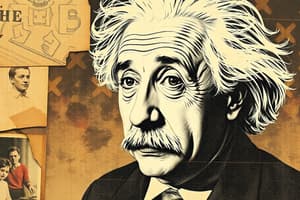Podcast
Questions and Answers
What phenomenon describes how time moves slower for objects in motion relative to a stationary observer?
What phenomenon describes how time moves slower for objects in motion relative to a stationary observer?
- Time Compression
- Chronological Delay
- Time Dilation (correct)
- Temporal Relativity
What principle states that the laws of physics are the same in all inertial frames?
What principle states that the laws of physics are the same in all inertial frames?
- Principle of Motion
- Principle of Relativity (correct)
- Principle of Invariance
- Principle of Equivalence
Which equation expresses the concept that mass can be converted into energy?
Which equation expresses the concept that mass can be converted into energy?
- E=mc³
- E=mc² (correct)
- E=mv²
- E=m²c
In General Relativity, what is the term for paths followed by objects in free fall in curved space-time?
In General Relativity, what is the term for paths followed by objects in free fall in curved space-time?
What does gravitational time dilation refer to?
What does gravitational time dilation refer to?
What branch of physics deals with the study of motion, forces, energy, and momentum?
What branch of physics deals with the study of motion, forces, energy, and momentum?
Which of the following describes wave-particle duality?
Which of the following describes wave-particle duality?
According to the uncertainty principle, what is true about certain pairs of physical properties?
According to the uncertainty principle, what is true about certain pairs of physical properties?
What significant prediction was made possible by the concepts from General Relativity?
What significant prediction was made possible by the concepts from General Relativity?
Which of the following is a branch of physics that studies heat, work, temperature, and energy transfer?
Which of the following is a branch of physics that studies heat, work, temperature, and energy transfer?
Flashcards are hidden until you start studying
Study Notes
Relativity
-
Definition: Theory proposed by Albert Einstein, fundamentally changing the understanding of space, time, and gravity.
-
Two Main Theories:
-
Special Relativity (1905)
- Principle of Relativity: Laws of physics are the same in all inertial frames.
- Key Concepts:
- Time Dilation: Time moves slower for objects in motion relative to a stationary observer.
- Length Contraction: Objects in motion are measured to be shorter in the direction of motion.
- Mass-Energy Equivalence: Expressed by the equation E=mc², indicating mass can be converted into energy.
-
General Relativity (1915)
- Extends Special Relativity to include acceleration and gravity.
- Key Concepts:
- Curvature of Space-Time: Massive objects cause a distortion in space-time, which is perceived as gravity.
- Geodesics: Objects in free fall follow paths (geodesics) in curved space-time.
- Gravitational Time Dilation: Time passes slower in stronger gravitational fields.
-
-
Impact: Revolutionized astrophysics and cosmology, leading to predictions like black holes, gravitational waves, and the expansion of the universe.
Physics
-
Definition: The natural science that studies matter, energy, and the fundamental forces of nature.
-
Branches of Physics:
- Classical Mechanics: Study of motion, forces, energy, and momentum.
- Thermodynamics: Examines heat, work, temperature, and energy transfer.
- Electromagnetism: Studies electric and magnetic fields and their interactions with matter.
- Quantum Mechanics: Focuses on the behavior of matter and energy at atomic and subatomic scales.
- Relativity: As discussed above, it delves into the effects of speed and gravity on time and space.
-
Key Concepts:
- Newton's Laws of Motion: Fundamental principles describing the relationship between a body and the forces acting on it.
- Conservation Laws: Includes conservation of energy, momentum, and charge.
- Wave-Particle Duality: In quantum mechanics, particles exhibit both wave-like and particle-like properties.
- Uncertainty Principle: In quantum mechanics, it states that certain pairs of physical properties cannot be simultaneously known with arbitrary precision.
-
Applications: Physics underpins various technologies, from electronics to engineering, healthcare (medical imaging), and environmental science.
Relativity
- Theory developed by Albert Einstein, reshaping the concepts of space, time, and gravity.
- Two primary theories:
- Special Relativity (1905): Focus on inertial frames where physics laws remain unchanged.
- Time Dilation: Moving clocks tick slower compared to stationary ones.
- Length Contraction: Objects appear shorter along the direction of motion.
- Mass-Energy Equivalence: Formula E=mc² illustrates mass's convertibility to energy.
- General Relativity (1915): Incorporates acceleration and gravity into the framework.
- Curvature of Space-Time: Massive entities warp space-time structure, causing gravitational effects.
- Geodesics: Free-falling objects move along the shortest paths in curved space-time.
- Gravitational Time Dilation: Stronger gravity leads to slower passage of time.
- Transformational impact on astrophysics and cosmology, predicting phenomena such as black holes and gravitational waves.
- Special Relativity (1905): Focus on inertial frames where physics laws remain unchanged.
Physics
- Natural science focused on understanding matter, energy, and the fundamental forces governing nature.
- Major branches include:
- Classical Mechanics: Studies motion, forces, and energy interactions.
- Thermodynamics: Concerned with heat, work, temperature, and energy exchanges.
- Electromagnetism: Examines electric and magnetic interactions with matter.
- Quantum Mechanics: Investigates behaviors of particles at atomic and subatomic levels.
- Relativity: Explores implications of speed and gravitational forces on space and time.
- Essential concepts include:
- Newton's Laws of Motion: Describe the interplay between objects and applied forces.
- Conservation Laws: Key principles ensuring energy, momentum, and charge remain constant.
- Wave-Particle Duality: Quantum mechanics reveals particles behave as both waves and particles.
- Uncertainty Principle: States some physical properties cannot be precisely known simultaneously.
- Applications of physics extend into multiple fields including electronics, engineering, healthcare (such as medical imaging), and environmental science.
Studying That Suits You
Use AI to generate personalized quizzes and flashcards to suit your learning preferences.




